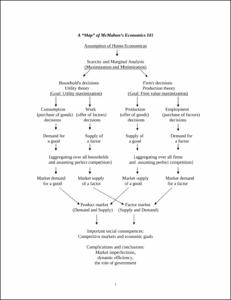Please use this identifier to cite or link to this item:
http://hdl.handle.net/10267/1238Full metadata record
| DC Field | Value | Language |
|---|---|---|
| dc.contributor.author | McMahon, Marshall | - |
| dc.date.accessioned | 2008-02-28T15:49:39Z | - |
| dc.date.available | 2008-02-28T15:49:39Z | - |
| dc.date.issued | 2008-02-28T15:49:39Z | - |
| dc.identifier.uri | http://hdl.handle.net/10267/1238 | - |
| dc.description | This syllabus was submitted to the Rhodes College Office of Academic Affairs by the course instructor. | en_US |
| dc.description.abstract | Primary goal: Demonstrate a mastery of economic analysis Specific objectives: By the end of the semester, the successful student will be able to 1. explain the meaning of “scarcity” in economics and how this scarcity: (a) is relevant even for relatively wealthy individuals and societies, (b) relates to the necessity of making individual and social choices, and (c) leads to consideration of the important concepts of “opportunity costs” and “constrained” maximization. 2. explain the model of consumer behavior used in economics and how the use of this model under the assumptions of perfect competition leads to the theoretical derivation of (a) the demand curve for a particular good or service and (b) the supply curve of the factor of production we call labor. 3. explain the model of production used in economics and how the use of this model under the assumptions of perfect competition leads to the theoretical derivation of (a) the supply curve for a particular good or service and (b) the demand curve for the factor of production we call labor. 4. explain in detail how prices get set in markets (a) for goods and services and (b) for factors of production under the assumptions of perfect competition. 5. explain in detail, using the above “pieces of the puzzle,” (a) the mechanism of supply and demand by which market societies make the choices necessitated by the existence of scarcity and (b) the consequences for the material well being of the members of that society. 3 6. explain in detail the costs and benefits to a market society when the assumptions of perfect competition are not met or when markets “fail,” and evaluate the use of government intervention in markets as a means for improving the material well being of the members of society when such problems arise. 7. explain the causes of the failures of the experiments in socialism as described by Muravchik in Heaven on Earth and evaluate both socialism and Muravchik’s explanation of its failures using what you have learned in this course. | en_US |
| dc.language.iso | en_US | en_US |
| dc.publisher | Memphis, Tenn. : Rhodes College | en_US |
| dc.relation.ispartofseries | Syllabi CRN | - |
| dc.relation.ispartofseries | 20226 | - |
| dc.rights | Rhodes College owns the rights to the digital objects in this collection. Objects are made available for educational use only and may not be used for any non-educational or commercial purpose. Approved educational uses include private research and scholarship, teaching, and student projects. For additional information please contact archives@rhodes.edu. Fees may apply. | - |
| dc.subject | Economics, Department of | en_US |
| dc.subject | Syllabus | en_US |
| dc.subject | Curriculum | en_US |
| dc.subject | Academic departments | en_US |
| dc.subject | Text | en_US |
| dc.subject | 2006 Spring | en_US |
| dc.title | ECON 101-03, Introduction to Economics, Spring 2006 | en_US |
| dc.type | Syllabus | en_US |
| Appears in Collections: | Course Syllabi | |
Files in This Item:
| File | Description | Size | Format | |
|---|---|---|---|---|
| 2006_spring_ECON_101.pdf | 76.58 kB | Adobe PDF |  View/Open |
Items in DSpace are protected by copyright, with all rights reserved, unless otherwise indicated.